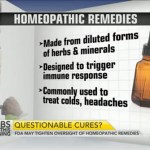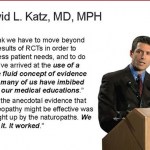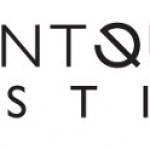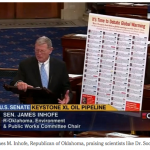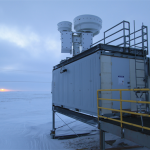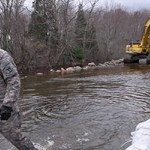Physical Sciences
Epigenetics.
As I've described before, to alternative medicine practitioners, epigenetics seems to mean something akin to what the word "quantum" means: Magic. I've covered, for example, the woo-filled stylings of Deepak Chopra invoking things like "quantum consciousness," and seemingly for quite a few years the best way to slap a patina of "sciencey"-sounding credibility on a pseudoscientific medical treatment has been to add the word "quantum" to it. Perhaps the epitome of this tendency was the infamous Quantum Xrroid Consciousness Interface promoted by a rather—shall we say?—flamboyant…
Once again, the yearly autism quackfest known as Autism One is fast approaching. In fact, it will begin in Chicago tomorrow: five days of "autism biomed" quackery and antivaccine pseudoscience. Ever since the Great Schism in the autism antivaccine quackery community, which severed Generation Rescue from Autism One and ended Jenny McCarthy's run of being the keynote speaker every year, it just hasn't been the same. Well, not quite. It turns out that a lot of the speakers are still the same, Generation Rescue or not, Jenny McCarthy or not. Just take a look at the speaker list, and you'll see a…
By High School Student Connor Smith, who is attending Cornell next year and studying chemistry.
The two speakers I enjoyed most at the 2015 X-STEM conference were Andrew Zwicker, a physicist from the Princeton Plasma Physics Laboratory, and William Pomerantz, the Vice President of Special Projects at Virgin Galactic. Dr. Zwicker talked primarily about his work on fusion reactors using high energy plasma, and the need for the development of clean energy technology. Read more
I've discussed on many occasions over the years how antivaccine activists really, really don't want to be known as "antivaccine." Indeed, when they are called "antivaccine" (usually quite correctly, given their words and deeds), many of them will clutch their pearls in indignation, rear up in self-righteous anger, and retort that they are "not antivaccine" but rather "pro-vaccine safety," "pro-health freedom," "parental rights," or some other antivaccine dog whistle that sounds superficially reasonable. In the meantime, they continue to do their best to demonize vaccines as dangerous, "toxin…
I recently noted that there are reasons to think that the effects of human caused climate change are coming on faster than previously expected. Since I wrote that (in late January) even more evidence has come along, so I thought it was time for an update.
First a bit of perspective. Scientists have known for a very long time that the proportion of greenhouse gasses in the Earth’s atmosphere controls (along with other factors) overall surface and upper ocean heat balance. In particular, is has been understood that the release of fossil Carbon (in coal and petroleum) as CO2 would likely warm…
“The heart can get really cold if all you've known is winter.” -Benjamin Alire Sáenz
If you didn't read everything this week on Starts With A Bang, it's hard to blame you. Each week, on practically a daily basis, we've got new pieces coming at you, sharing the wonders of the Universe in our own unique fashion. The past seven days alone saw the following:
Hubble vs. the Big Bang (for Ask Ethan),
The horrible conditions of s'more factory farms (for our Weekend Diversion),
NASA's greatest observatories view the galactic center (for Mostly Mute Monday),
What happens to…
Well, it's over.
I'm referring to the two day hearing held by the FDA in Bethesda seeking public comment regarding how it should modernize its regulation of homeopathic products. Actually, as I discussed before (as did Jann Bellamy over at my favorite other blog, Science-Based Medicine), in fact it's arguable wither there is currently much, if any, actual regulation of homeopathic remedies. Oh, sure, sometimes when a foolish company or true believer tries to market something as unremittingly dangerous as a homeopathic asthma nasal spray, the FDA takes notices. However, for the most part, the…
The American Biology Teacher has hosted a guest editorial by Glenn Branch and Minda Berbeco of the NCSE. The editorial points out that climate science is under a similar sort of anti-science attack as evolution has been for years, though generally with different (less religious) motivations. Also noted is the problem of fitting climate change into the curriculum, especially in biology classes. Indeed, biology teachers are already having a hard time getting the standard fare on the plate. In recent years, for example, the AP biology curriculum has jettisoned almost everything about plants…
Dr. David Katz is undoubtedly a heavy hitter in the brave new world of "integrative medicine," a specialty that seeks to "integrate" pseudoscience with science, nonsense, with sense, and quackery with real medicine. In fairness, that's not the way physicians like Dr. Katz see it. Rather, they see it as "integrating" the "best of both worlds" to the benefit of patients. However, as we've documented extensively here, on our personal blogs, and even in the biomedical literature (plug, plug), what "integrative" medicine means in practice is indeed what I characterized, the infiltration of woo…
Maybe, maybe not. There is a new paper that looks at what climate scientists call “synoptic midlatitude temperature variability” and the rest of us call “cold snaps” and “heat waves.” The term “synoptic” simply means over a reasonably large area like you might expect a cold snap or heat wave to be. Specifically, the paper (Physics of Changes in Synoptic Midlatitude Temperature Variability, by Tapio Schneider, Tobias Bischoff and Hanna Plotka, published in Journal of Climate) concludes that as human-caused greenhouse gas pollution increases, the frequency of cold snaps in the northern…
Predatory open access journals seem to be a hot topic these days. In fact, there seems to be kind of a moral panic surrounding them. I would like to counter the admittedly shocking and scary stories around that moral panic by pointing out that perhaps we shouldn't be worrying so much about a fairly small number of admittedly bad actors and that we should be more concerned with the larger issues around the limitations of peer review and how scientific error and fraud leak through that system.
I'm hoping my methodology here will be helpful. I hope to counter the predatory open access (OA)…
The New York Times Styles Section giveth. The New York Times Styles Section taketh away.
Last week, The NYT Styles Section published an excellent deconstruction of the pseudoscientific activities of Vani Hari, a.k.a. The Food Babe, by Courtney Rubin. Although skeptics might think that it was a tad too "balanced" (as did I), by and large we understand that this was the NYT Style section, and seeing a full-throated skeptical deconstruction of The Food Babe's antics in such a venue is just not in the cards. That's what I'm there for (not to mention other skeptics like Steve Novella), such as…
A few years back, I became aware of Mike Brotherton's Launch Pad Astronomy Workshop, and said "somebody should do this for quantum physics." At the time, I wasn't in a position to do that, but in the interim, the APS Outreach program launched the Public Outreach and Informing the Public Grant program, providing smallish grants for new public outreach efforts. So, because I apparently don't have enough on my plate as it is, I floated the idea with Steve Rolston at Maryland (my immediate supervisor when I was a grad student), who liked it, and we put together a proposal with their Director of…
If you have not been living in a cave, and had you been, I’d respect that, you know about Willie Soon Gate. Willie soon is a researcher on soft money at the Harvard Smithsonian Center for Astrophysics. Soon is well known for producing research of questionable quality that anemically attempts to buck the scientific consensus that human caused greenhouse gas pollution is rapidly raising the Earth’s temperature. Soon’s links to the fossil fuel industry have been known for some time, but recently, he has gotten into even more hot water over having published papers without properly disclosing that…
New Research on the Effects of CO2 Pollution
A paper just published in Nature reports on the direct measurement of the effects of human greenhouse gas pollution on the heating of the Earth’s atmosphere. This is empirical verification of anthropogenic global warming.
Since the Industrial Revolution, when humans started polluting the Earth’s atmosphere with copious amounts of long lived greenhouse gases released from entombment as fossil fuels, the amount of CO2 in the atmosphere has skyrocketed from close to 250 parts per million (ppm) to about 400ppm. In fact, February was the first month…
A newly published study has identified changes in precipitation patterns in the US Northeast, which are likely caused by human pollution of the atmosphere with greenhouse gasses, which has resulted in global warming. According to the study, there has been an increase in extreme precipitation events, and an increase in the clumping across time of precipitation, with longer or more intense rainy periods, and longer dry periods.
Generally, climate and weather watchers have noticed that arid regions are drier, wetter regions are wetter, and many feel this is a consequence of global warming.…
A sort of follow-up to last week's post about the STEM "pipeline". In discussions on Twitter sparked by the study I talked about last week, I've seen a bunch of re-shares of different versions of this graph of the percentage of women earning undergrad degrees in physics:
Fraction of BA/BS degrees in physics awarded to women over time. From AIP Statistical Research.
You can clearly see that after a fairly steady rise through the 80's and 90's, this trend has flattened out over the last decade. If you crop the horizontal axis to start in the early 2000's, you can actually see a decline from…
Or so says Christine Pulliam, a spokeswoman for the Harvard-Smithsonian Center for Astrophysics. And yet we discover that Soon's research was (partially) funded by Southern Company Services, with whom Soon had and agreement, signed by Smithsonian’s William J. Ford, contract and grant specialist; and Bryan Baldwin, Southern’s manager of environmental assessment.:
As further consideration to SCS [Southern Company Services], Smithsonian shall provide SCS an advance written copy of proposed publications regarding the deliverables for comment and input, if any, from SCS
The assertion of no…
Via Curt Rice (or, more precisely, somebody on Twitter who posted a link to that, but I didn't note who) there's a new study in Frontiers in Psychology of the STEM "pipeline", looking at the history of gender disparities in STEM degrees. You can spin this one of two ways, the optimistic one being "Women now continue on from bachelors degrees to Ph.D.'s at the same rate as men!" and the pessimistic one being, well, Rice's post.
The accurate description, as is often the case in social science, "This stuff is really messy and confusing." Rather than being a set of nice straight pipes going from…
Bill Maher did it again last night, doubling down on his anti-vax nonsense claiming the real problem is we haven't done a controlled population-based trial on vaccination vs non-vaccination. Sadly, I don't have a clip, but I have to say this time at least I was gratified that his panel wasn't composed of complete morons and they actually challenged him on some of his nonsense. This is actually a classic impossible expectations denialist argument, he essentially proposes an experiment that would be wildly expensive, impossible to perform, and highly unethical. Worse, it still is internally…




